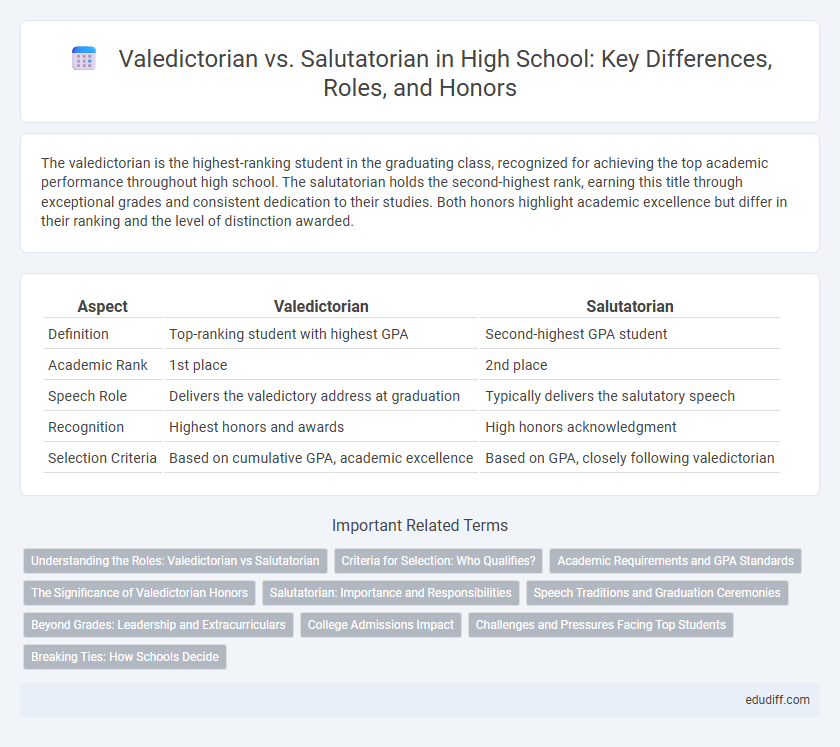The valedictorian is the highest-ranking student in the graduating class, recognized for achieving the top academic performance throughout high school. The salutatorian holds the second-highest rank, earning this title through exceptional grades and consistent dedication to their studies. Both honors highlight academic excellence but differ in their ranking and the level of distinction awarded.
Table of Comparison
| Aspect | Valedictorian | Salutatorian |
|---|---|---|
| Definition | Top-ranking student with highest GPA | Second-highest GPA student |
| Academic Rank | 1st place | 2nd place |
| Speech Role | Delivers the valedictory address at graduation | Typically delivers the salutatory speech |
| Recognition | Highest honors and awards | High honors acknowledgment |
| Selection Criteria | Based on cumulative GPA, academic excellence | Based on GPA, closely following valedictorian |
Understanding the Roles: Valedictorian vs Salutatorian
The valedictorian is the highest-ranking student in a high school graduating class, recognized for achieving the top academic performance and often delivering the farewell speech at commencement. The salutatorian holds the second-highest academic rank, awarded to the student with the next best grades, and typically presents the opening or welcoming remarks during the ceremony. Both roles honor outstanding scholarship and leadership, highlighting distinct academic achievements within the senior class.
Criteria for Selection: Who Qualifies?
The valedictorian is typically the student with the highest cumulative GPA, demonstrating exceptional academic achievement across all coursework. The salutatorian ranks second in academic standing, reflecting consistently strong performance but with a slightly lower GPA than the valedictorian. Selection criteria often include rigorous course loads, standardized test scores, and participation in advanced placement or honors classes.
Academic Requirements and GPA Standards
Valedictorians must achieve the highest GPA in their graduating class, often requiring a weighted GPA above 4.0 in honors, Advanced Placement, or International Baccalaureate courses. Salutatorians hold the second-highest GPA, typically meeting slightly lower but still rigorous academic standards. Both require consistent academic excellence, but the valedictorian's GPA must surpass all peers in cumulative score and course difficulty.
The Significance of Valedictorian Honors
Valedictorian honors represent the highest academic achievement in a high school graduating class, awarded to the student with the highest Grade Point Average (GPA) or academic rank. This distinction often includes the privilege of delivering the valedictory address during commencement, symbolizing leadership and excellence. Recognition as valedictorian can significantly impact college admissions and scholarship opportunities, highlighting the student's dedication and superior academic performance.
Salutatorian: Importance and Responsibilities
The salutatorian holds a significant academic position as the second-highest ranking student in the graduating class, often recognized for outstanding GPA and leadership qualities. Responsibilities typically include delivering the salutatory address at graduation ceremonies, symbolizing the voice of the student body and setting a tone of inspiration. This role reflects both academic excellence and the ability to represent peers, highlighting the student's commitment to education and community involvement.
Speech Traditions and Graduation Ceremonies
The valedictorian traditionally delivers the final speech at graduation ceremonies, expressing gratitude and inspiring peers with personal reflections and future aspirations. The salutatorian usually opens the ceremony by welcoming attendees and setting a respectful tone with a speech that acknowledges collective achievements. Both roles uphold longstanding speech traditions that honor academic excellence and contribute to the ceremonial structure of high school graduations.
Beyond Grades: Leadership and Extracurriculars
Valedictorians and salutatorians often distinguish themselves not only through academic excellence but also by demonstrating exceptional leadership and active participation in extracurricular activities. Valedictorians typically serve as student body presidents, lead clubs, or organize community service projects, reflecting their broader influence and commitment. Salutatorians frequently contribute as team captains, club officers, or key volunteers, showcasing strong leadership skills that complement their academic achievements.
College Admissions Impact
Colleges often view the valedictorian as the highest academic achiever in the graduating class, which can enhance admissions prospects by highlighting consistent top-tier performance and leadership potential. The salutatorian, as the second-highest ranked student, also demonstrates strong academic excellence and can positively influence admissions decisions, especially when supported by rigorous coursework and extracurricular achievements. Both titles emphasize academic distinction, but the valedictorian title may carry a slight advantage in highly competitive college admissions.
Challenges and Pressures Facing Top Students
Top high school students vying for valedictorian or salutatorian titles face intense academic pressure and heightened expectations from teachers, parents, and peers. Balancing rigorous coursework, extracurricular activities, and college application demands often leads to stress, anxiety, and burnout among these high achievers. The competition to maintain top class rank intensifies the challenge of managing time effectively while preserving mental health and personal well-being.
Breaking Ties: How Schools Decide
When high schools face ties between Valedictorian and Salutatorian candidates, they often use weighted GPA calculations, including advanced placement and honors course credits, to break the tie. Schools may also consider standardized test scores, extracurricular achievements, or teacher recommendations as secondary criteria. Some institutions implement a weighted scoring system that factors in semester grades, class rigor, and leadership roles to ensure a fair and comprehensive decision.
Valedictorian vs Salutatorian Infographic

 edudiff.com
edudiff.com